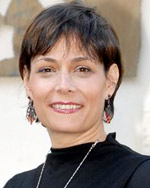Beginning at sundown on Thursday, the Jewish world will celebrate Shavuot, the Festival of Weeks, the holiday that celebrates the giving of the Torah at Mount Sinai more than 3,300 years ago. Shavuot is also known as the Harvest Festival.
I like these two dimensions of the holiday—the spiritual one and the earthy one—that offer an accurate reflection of human nature by mirroring one’s aspirations to elevate alongside the basic need to stay rooted.
Growing up in Jerusalem offered me varied opportunities to celebrate the holiday, and I took advantage of them all. From the traditional staying up all night at the Kotel, the Western Wall, surrounded by tens of thousands of people, all inspired by the greatness of the human river, streaming along the old narrow alleys of the capital’s Old City to be present at sunrise for morning prayers.
I also took part in pluralistic gatherings where Torah-lovers, both men and women, shared their wealth of knowledge with mixed crowds, observant and secular Jews, joined by their thirst for study.
In the past, only observant Jews filled the streets on the night of Shavuot, rushing from one class to another as part of the traditional “Tikkun Leil Shavuot,” the all-night Torah study. However, Jewish text, wisdom, and practice belong to us all. In more recent years, all-night study events have expanded beyond the closed walls of Orthodox synagogues and yeshivot to reach all, not only synagogue-comers. The streets of Israel are now colorful, filled with people of all ages, from all backgrounds, seeking to be part of Jewish text. These are the true colors of Judaism.
Nearly 50 days ago, we celebrated the Exodus from Egypt around festive Pesach tables, but the exodus was only complete with the giving of the Torah, when the physical redemption from Egypt met ethics, values, rituals, and beliefs that truly make us the Jewish people.
Shavuot, like all celebrations in recent months, will look and feel different this year. Although Israel has fully reopened, we still are required to maintain distance and limit large gatherings. These restrictions will lead to a rich and varied menu of online opportunities, resulting in more Torah study, not less. More than ever, in Israel and around the Jewish world, lovers of Torah will find ways to share their love and curiosity for knowledge.
The Torah, our Tree of Life, is, in fact, our manual for moral living, addressing all aspects of life. In happy times and sorrowful ones, the Torah, leads by example, teaching us how to treat the poor, the orphan, the prisoner, the foreigner, and anyone else we encounter. Given by God to God’s messenger, the Torah shows us that even Moses, the greatest Jewish leader of all time, needed help from his brother Aaron to lead our people. Just as Moses faced life’s challenges and difficulties, so do we. And like Moses, we rely on others to overcome them
In recent months, we have seen endless acts of caring, compassion, generosity, volunteerism. and more, offering us a view of the world that demonstrates that, indeed, we are in this pandemic together. The novel coronavirus, blind to politics, religion, skin color, socio-economic status, or anything that divides us has, in fact forced us to think together, fight together, and overcome together.
The pandemic may not allow us to be physically together to study on Shavuot, but it can’t extinguish our desire to connect—in all our diversity—to celebrate Jewish life, Torah, and the wisdom it can teach us.
 Leah Garber is a vice president of JCC Association of North America and director of its Center for Israel Engagement in Jerusalem.
Leah Garber is a vice president of JCC Association of North America and director of its Center for Israel Engagement in Jerusalem.
Looking for other ways to stay connected to the JCC Movement? Sign up below for email updates, including a new quarterly newsletter coming soon, and visit us on Facebook, Instagram, and Twitter.
I just want to tell that I always love reading your letters. They are very insightful and full of feeling. They even sometimes bring tears to my eyes.
Wishing you and your loved ones a wonderful Shavuot.